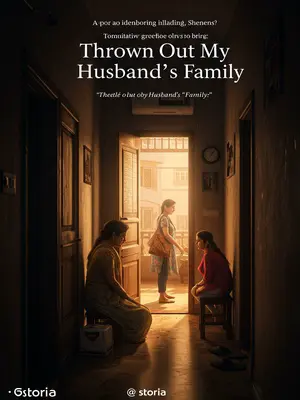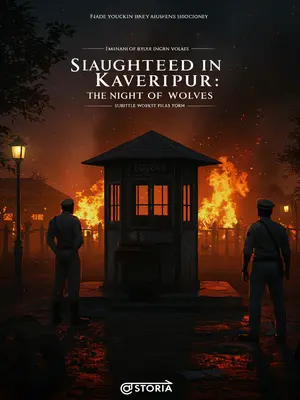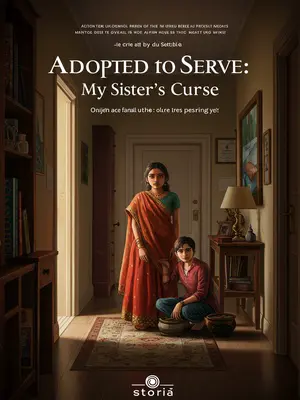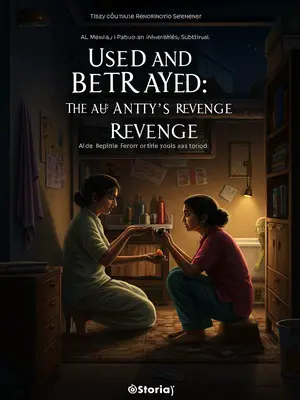Chapter 2: The Curtain, The Kicks, and the Limits of Patience
But things didn’t end there.
I should have known—people like him never let things go. There’s always one more way to assert dominance, to make sure you know your place.
Just as I put my hand up, the man behind me suddenly got annoyed and yanked the curtain down hard.
His hand shot out and jerked the curtain so forcefully that the little metal rod at the bottom flew up. I barely had time to react.
Anyone who’s taken an Indian express train knows—the bottom of the curtain has a metal strip.
It’s always cold, a bit rusty, and heavy enough to make you wince if it catches your fingers. In the chaos of train travel, these little things become unexpected weapons.
The metal piece slammed down onto my fingers. A sharp yelp escaped me before I could stop it—my fingers throbbed, and I pressed them to my lips, blinking away tears.
The pain was sharp, electric. I hissed, trying not to curse out loud. The auntie nearby looked up, eyebrows raised in sympathy, but quickly returned to her crossword—nobody wants to get involved.
But the man just said coldly, "I told you I’m watching a movie. You still pull up the curtain on purpose? Are you looking for trouble? With the sunlight coming in, I can’t see the screen."
His words were like ice, the kind you hear from a bureaucrat refusing your file. The entitlement was staggering. He didn’t even bother to ask if I was hurt. Just his own comfort mattered.
At this point, I finally lost it.
Something inside me snapped. The years of discipline, of swallowing insults for the sake of peace, crumbled. My voice rose, echoing down the compartment.
I turned around and snapped, "You won’t let me recline, you won’t let me pull the curtain—do you think this train is your house?"
The anger in my voice was unmistakable, and for a brief moment, there was silence. Even the kids two seats down stopped their noisy game. In India, calling someone out in public is always a risk—sometimes it works, sometimes it backfires spectacularly.
He sneered, "The train isn’t my house, but it’s not yours either. Ek aur lafda karega toh dekh loonga tujhe."
He puffed up his chest, as if daring me to take things further. The threat hung in the air, heavy and ugly. In our country, these words are both a challenge and a warning: 'Dekh lunga tujhe.'
I was so angry I actually laughed.
The absurdity of the moment caught me off guard. I let out a short, bitter laugh, shaking my head at his childishness. Inside, I felt the old army instinct flaring, my muscles tensing involuntarily.
He’d beat me up?
As if. He had no idea what I was capable of. But these are the kinds of men who rely on words, not action.
It was more likely I’d beat him up.
I could have pinned him in two seconds flat, army style. But what would that achieve? Only more trouble.
I’m a retired army man—my back pain is an old injury from my service.
I remembered crawling through trenches, carrying wounded comrades, the medals gathering dust in my father’s almirah back home. I had fought bigger battles than this, but today, I just wanted a peaceful ride.
But the problem is, I absolutely can’t get into a fight.
My job depends on it. Even a hint of trouble, and my supervisor back at the PSU would find out. In India, rumours travel faster than the express train.
After retiring, I took a civilian job, and my unit cares a lot about my record. If I got into a fight, I could even lose my job.
These days, even a small police complaint can derail years of hard work. One viral video, and your reputation is gone. Better to swallow your pride than risk everything over a seat.
In this situation, I was really at a disadvantage.
I slumped back, feeling defeated. The compartment lights flickered as we entered a tunnel, darkness pressing in for a moment. My own helplessness felt just as thick.
I never imagined that just taking a train home, I’d run into someone like this.
I had expected the usual: vendors selling biryani at the stations, chai in kulhads, mothers feeding kids homemade parathas. Instead, I got a lesson in how quickly a journey can become a battleground.
Overcome with frustration, I simply pushed my seat back again, not caring what he thought.
I heard the lever click as I reclined, my jaw set. Enough was enough. If he wanted to escalate, let him. I refused to be bullied anymore.
I locked the lever in place and, for the first time that day, allowed myself a real smile.
He shoved it a few times in anger, but I’d already locked the seat—this time, he couldn’t move it.
He grunted with effort, but the seat didn’t budge. A small victory, but one that made my heart race. The auntie with the crossword gave me a tiny, approving nod.
He got pissed, raised his foot, and kicked the back of my seat hard a few times, snapping, "Sit up straight."
The kicks reverberated through my spine, each one a petty, childish act of revenge. I gritted my teeth, refusing to react.
I ignored him.
In India, sometimes ignoring is the only answer. I put on my most bored expression, as if his tantrums were nothing more than a mosquito buzzing near my ear.
Thinking of his earlier behaviour, I said offhandedly, "This is my right. If you don’t like it, go find the attendant."
I made sure to speak just loudly enough for the nearby passengers to hear. If the staff won’t intervene, maybe public opinion will.
Since the staff think passengers should solve these things themselves, then fine—let’s see who’s tougher.
I straightened my kurta and folded my arms, looking ahead with a calmness I didn’t quite feel. Sometimes, you have to put on a show of strength, even if your heart is pounding.
The man stared at me, incredulous. "Why do you insist on doing such rude things? Didn’t your dad teach you anything?"
It was the ultimate Indian insult, bringing up my upbringing. For a moment, I saw red. But I held back, not wanting to stoop to his level.
Some passengers noticed and started watching, but nobody spoke up.
Typical. In India, people love a spectacle, but rarely intervene unless things get physical. A few exchanged glances, but mostly they preferred to watch from the sidelines.
He continued, "Reclining your seat bothers others. Don’t you understand basic manners? I admit I reclined too, but there’s no one behind me. How is that the same?"
His logic was twisted, but delivered with the conviction of a man who believed he was always right. I could have argued further, but what was the point?
I glanced at him and put on my headphones.
I chose an old Lata Mangeshkar song, the kind my mother used to hum while making rotis. Music has a way of drowning out even the loudest idiots.
When you’re out in public, arguing is pointless. Just make your stance clear.
I shut my eyes and let the music wash over me, determined not to let his pettiness ruin my trip.
Seeing I was ignoring him, he sneered, muttering, "Who’s afraid of who?"
His voice was a low growl, barely audible over the music. I pretended not to hear.
Then he did something I never expected.
You’d think by now, he’d be tired. But some people can’t let go, not until they’ve made their point ten times over.
Just like before, he started kicking the back of my seat—over and over.
The kicks came in a steady rhythm, a childish drumbeat of anger. The seat shuddered with each blow, but I refused to react. I counted the kicks, letting each one fuel my resolve.
The worst part was, he had no intention of stopping.
Minutes stretched into what felt like hours. The pain in my back grew worse, but my stubbornness grew with it.
At first I endured it, but after twenty minutes, he was still at it, like a child.
Twenty minutes of this nonsense—like a spoilt kid throwing a tantrum in a sweet shop. My patience, already worn thin, was now hanging by a thread.
My back was killing me. I just wanted to lie on my side. When I turned, I suddenly felt something hit my head.
For a split second, I wondered if the overhead bag had fallen. But no—it was worse.
I looked up, stunned.
The man had actually put his foot on top of my head.
Disbelief crashed through me. In all my years, I had never been treated like this, not even during the roughest days in the army. The humiliation was total.
Furious, I shoved his foot away, but he pointed at me and threatened, "Using your hands now? Want to fight? Where’s the attendant? Where’s the railway police? Come here, there’s a fight!"
His voice was a shrill, theatrical whine—drawing the attention of everyone nearby. He acted as if I was the aggressor, conveniently forgetting his own behaviour.
I was livid.
My fists curled, nails digging into my palms. I bit my tongue, knowing that one wrong move could ruin everything. Inside, a storm raged.
How did I end up meeting such a jerk?
I looked around for support, but all I got were a few sympathetic glances and the usual advice: 'Let it go, beta.' In this country, sometimes you’re on your own, no matter how right you are.
The attendant came over again. After I explained, she said helplessly to the man, "Sir, please behave yourself. Don’t put your feet on someone else’s head."
Her words were gentle but firm, the way a teacher scolds a naughty student. But the man just shrugged, as if she was being unreasonable.
The man replied, "Then make him sit upright first."
He was relentless, refusing to take responsibility. There was no reasoning with him.
The attendant said, "Can’t you be a little more tolerant?"
She tried her best to mediate, but her voice lacked conviction. She glanced at me apologetically, as if she wished she could do more.
He snapped, "Tolerant of what? I’m riding all the way to the last stop. Am I supposed to be miserable the whole way?"
His words dripped with self-pity, painting himself as the victim. For a second, I wondered if he even heard himself.
As soon as I heard that, I broke down.
The finality of it hit me like a punch—I was also going to the last stop. There was no escape, no getting off early. The thought of hours more in this company made me want to scream.
Because I was also riding to the last stop. The thought of sitting with this fellow for the whole trip nearly made me lose it.
I felt a wave of despair, picturing my old friends waiting at the station, unaware of the drama unfolding here.
I figured, since it’s rare to go home and see my family, it’s better to avoid trouble. So I said to the attendant, "I’d like to upgrade my seat. I’m also going to the last stop. Can you check if there’s an empty seat all the way there?"
My voice was quiet, almost pleading. I was ready to spend extra, just to get away from this nightmare.
Before the attendant could reply, the man jeered, "Oh, want to upgrade now? That’s rich. If you’ve got so much money, why’d you buy sleeper class?"
His words were laced with mockery, the kind you hear from relatives who judge you for buying a new phone when your slippers are still torn. I ignored him.
I didn’t want to argue. The attendant quickly checked the ticket machine and finally said apologetically, "There’s no seat in AC 2-tier. It’s May Day, tickets are really hard to get. If you want to upgrade, only First Class is available."
Her eyes flickered with genuine sympathy. Everyone knows how hard it is to get a last-minute seat in India, especially on a holiday. First Class was a luxury I couldn’t afford.
I hesitated—I couldn’t afford First Class.
I did a quick calculation—salary, monthly expenses, the new school shoes I promised my son. No way could I justify that kind of splurge.
Sleeper is over 400 rupees, AC 2-tier over 700, First Class is 1,500.
His words stung, but I pictured my daughter’s face when she’d see the new bat. No, I wouldn’t waste the money.
Spending 1,500 for a few hours? My income isn’t that high.
I shook my head, feeling defeated. Sometimes, money really is the final judge.
I could only sigh and say, "Forget it."
The words tasted bitter on my tongue. I tried to hide my disappointment, but the attendant could see it in my eyes.
Hearing this, the man jeered even more loudly, "Trying to act rich and failed, is it? Weren’t you going to upgrade? Go to First Class then. No money, what are you pretending for?"
The nastiness in his voice made my blood boil. Some of the younger passengers shot him dirty looks, but nobody said a word. I focused on breathing, on not letting his words pierce too deeply.
His words were so nasty, even the attendant couldn’t stand it. She pointed to a seat three rows ahead and said to me, "You can sit there for now. That seat will be empty for a while. Just move back when someone comes. Can you two calm down?"
Her kindness was a balm. I nodded gratefully, gathering my bag and water bottle. Anything to get away from this toxic man.
I thought about it and agreed.
I shot one last look at the man—he was smirking, victorious. I decided to let him have his moment. I’d won something more important: peace.
As long as I could get away from this fellow, anything was fine.
I settled into the new seat, stretching my legs and breathing in relief. The world suddenly felt lighter.
I stood up to change seats. The man was delighted, and even made a show of dancing in public: "Oh, justice has prevailed! The idiot who likes to recline has been driven off!"
His little jig was so childish that a few passengers laughed quietly. I ignored him, refusing to give him the satisfaction of a reaction. My dignity mattered more.
I didn’t respond—just sat in the front row.
I leaned back, closed my eyes, and tried to focus on the gentle sway of the train. For a while, the world outside the window took over—endless fields, distant villages, the occasional flutter of kites in the sky.
Finally, I felt comfortable. I played on my phone for a while.
WhatsApp was buzzing with messages from old friends—memes, plans for the evening, questions about who was bringing what to the get-together. One friend messaged: "Don’t forget the Old Monk, haan!"—and I couldn’t help but smile.
On WhatsApp, some old army friends who were driving said they’d pick me up.
I grinned at my phone, picturing the laughter and camaraderie that awaited. Just a few more hours, I told myself.
I chatted happily with them, but the peace didn’t last. Though I avoided him for a few hours, as soon as someone boarded for that seat, I had to return to my own.
Indian trains are never short on surprises. As soon as the new passenger arrived, I had to make my way back. The walk down the aisle felt like a march back to the front lines.
When I got back, I found the man snoring, fast asleep.
His head lolled to one side, mouth open, a little trail of drool threatening to escape. I almost laughed at the sight. At least now, there would be some peace.
I breathed a sigh of relief, hoping he’d sleep until the end of the trip.
I reclined my seat and rested a bit. During that time, the man woke up, saw my seat was reclined, but said nothing.
Perhaps he was too groggy, or maybe he had tired himself out from all the drama. For the first time, there was silence between us.
I secretly wondered—maybe the worst had passed, maybe we understood each other a bit now?
I dared to hope that the worst was over, that we could coexist in uneasy truce. Sometimes, fatigue is the greatest peacemaker.
But I was giving him too much credit.
The Indian in me should have known better. A leopard rarely changes its spots.
The man went to the restroom. Just as I was feeling hungry, I started making some instant noodles.
The smell of masala mingled with the sharp tang of disinfectant from the corridor. Someone was selling boiled eggs, calling out, "Anda, anda!" as I stirred my noodles.
Anyone who’s made instant noodles on the train knows: you first fill half a cup of hot water, then carry the noodles back to your seat and add the masala. That’s the safest way.
Years of train travel had taught me these little hacks—how to balance a cup of steaming water without spilling, how to stir in the masala without getting it all over your clothes.
But as I was carefully adding the masala, I didn’t notice the man returning from the restroom.
He suddenly plopped down in front of me, slammed his seat back hard, and cursed, "You..."
The drama, it seemed, was not over. But as the train continued its journey home, the memory of those few hours—of pain, anger, and stubborn pride—would stay with me far longer than any instant noodle aroma ever could. But as the train slowed for the next stop, I realized the real journey was just beginning.
Outside, the sun dipped behind the fields, and the train’s whistle cut through the evening air—reminding me that home was getting closer, no matter what.













